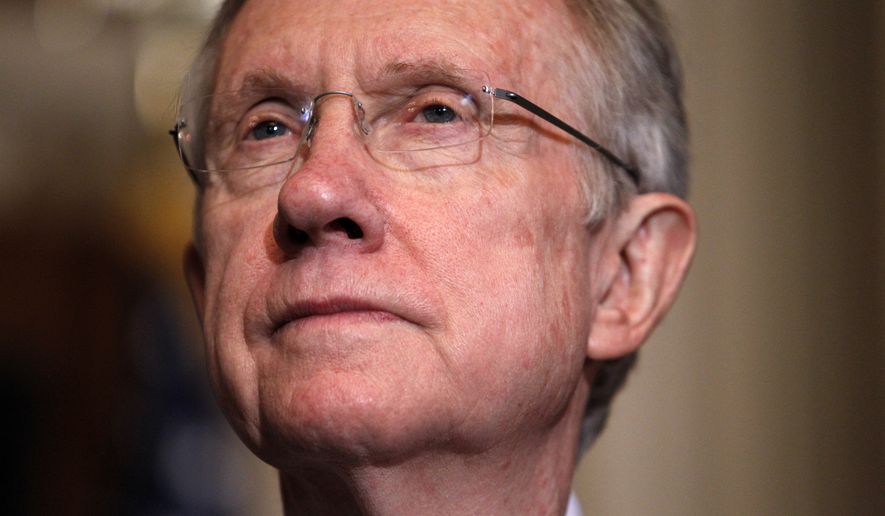Even with the backing of such political high rollers as Senate Majority Leader Harry Reid, the push to expand legal Internet gambling in the United States looks to face much longer odds in the more heavily Republican Congress.
Mr. Reid, Nevada Democrat, came up short last month during the congressional lame-duck session in his bid to allow U.S. casino companies to establish Internet poker sites and give them a cut of the multibillion-dollar offshore industry.
Mr. Reid is poised to try again this year, but his path may be blocked by Rep. Spencer Bachus, the Alabama Republican who has been named chairman of the House Financial Services Committee, and other GOP lawmakers who appear steadfast about keeping online betting illegal in the U.S.
“This is a huge priority for Spencer,” said a top House GOP staffer.
In fact, if Mr. Bachus addresses Internet gambling in the 112th Congress, such action would focus on examining the effectiveness of existing laws and making them tougher, the staffer said.
A wide range of U.S. business interests are scrambling to reboot in the face of the major power shift on Capitol Hill after the midterm elections.
Mr. Reid’s re-election in November heartened the gambling industry, but the overall results presented a mixed bag, industry watchers say.
“If 2010 is any sign of what’s to come in the future for online poker, the only thing that is really for certain is that the road is a long, bumpy one and the legalization of online poker will be very difficult to come by,” reported PokerNews.com.
The Off Shore Gaming Association, in its year-end policy roundup, noted, “The results certainly weren’t ideal, but the fact that Mr. Reid has remained as Senate majority leader and the fact that the Republicans didn’t win control of both houses lends some hope to gambling’s future in the upcoming years.”
A 2006 law essentially banned banks from transmitting payments between bettors and gambling operations. The Democrat-controlled Congress helped delay full implementation of the law until last year. House Financial Services Committee Chairman Barney Frank, Massachusetts Democrat, pushed a bill during the summer that would have effectively overturned the law by legalizing online poker and other non-sports wagering.
The measure never received a full House vote, and Attorney General Eric H. Holder Jr. has said he will not support efforts to legalize online gambling. The Obama administration has cited concerns of money laundering and underage betting.
Mr. Bachus joined Rep. David Camp, Michigan Republican and the incoming chairman of the House Ways and Means Committee, and Rep. Lamar Smith, the Texas Republican who is poised to take over the House Judiciary Committee, in sending a strongly worded letter to Mr. Reid opposing his attempt during the lame-duck session to license and tax Internet gambling and cautioning the majority leader about future negotiations.
The Dec. 1 letter also said that interest groups were reportedly behind the draft legislation because they “have calculated that a secretive, closed-door, undemocratic process represents their best opportunity to regain access to U.S. markets.”
A Reid spokesman told The Washington Times that the majority leader still hopes to enact such a bill, and a leading gambling lobby group predicts legislation within the next few months.
“I fully expect something early next year,” said John Pappas, executive director of the Washington-based Poker Players Alliance. Mr. Pappas said supporters of Internet gambling are working with Reid staffers to address concerns raised in the failed legislation.
“This is public policy that makes sense,” he said. “Nobody, Republicans or Democrats, can believe the status quo is acceptable — playing [poker] overseas without protection and not realizing any of the revenue.”
Republicans scoff at the idea that legalizing online wagering could generate significant revenue and point to fundraising records for Mr. Reid’s 2010 bruising, expensive re-election campaign as evidence of a possible payback.
Offshore gambling is an estimated $6.2 billion industry. Mr. Reid wants to tax only online poker at roughly 20 percent, which would equal about $1.2 billion.
“That’s pretty poor compared to the $700 billion [bank bailout bill],” said one GOP policy staffer.
Supporters have estimated that revenue would amount to $10 billion to $40 billion over the next 10 years.
Industry watchers say Mr. Reid — who once opposed Internet gambling — hinted in August that he might change his mind, as tea party-backed GOP Senate candidate Sharon Angle appeared poised to keep him from serving a fifth term. They also said his legislation would have granted the first licenses to Nevada and other casino states because they have established regulatory programs.
By the time Mr. Reid eked out a win on Nov. 2, he had received at least $650,000 from several Las Vegas casino companies, including MGM Resorts International, which owns the Bellagio, and Harrah’s Entertainment, whose holdings include Caesars Palace.
MGM executives, employees and the company’s political action committee collectively gave $192,450, making them Mr. Reid’s top campaign contributor. Executives and employees of Harrah’s — now known as Caesars Entertainment — and the corporate political action committee gave $83,100 to Mr. Reid, making them collectively Mr. Reid’s fourth-largest donor, according to the Center for Responsive Politics.
“If it brings revenues and jobs into the United States, it’s the right thing to do,” MGM spokesman Alan Feldman told NBC News in an interview. “As a country, we’ve allowed jobs and tax revenues to be outsourced to Europe and parts of the Caribbean.”
• Joseph Weber can be reached at jweber@washingtontimes.com.old.




Please read our comment policy before commenting.